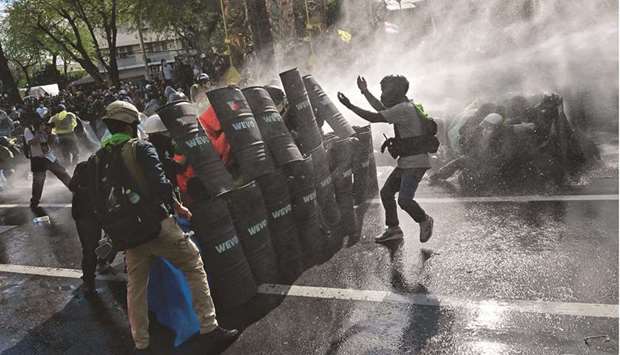Police used tear gas, water cannon and rubber bullets to disperse protesters trying to march on Thai Prime Minister Prayut Chan-o-cha’s office on Sunday to demand he resign over his handling of the coronavirus pandemic and its economic impact.
Some protesters attacked police and eight police officers and at least one reporter were injured during the clashes, police said.
Police did not say if any protesters were injured, but said 13 protesters were arrested.
Protest organisers called for the demonstration to end just after 6pm but a stand-off between the police and hundreds of protesters continued for several more hours before the police dispersed the crowd just before the start of a 9pm curfew that is in force in the Thai capital.
More than 1,000 people had joined the demonstration.
Police intervened with force after some protesters tried to dismantle barbed wire and metal barricades set up by the authorities to block roads from Democracy Monument to Government House where the prime minister works.
Deputy police spokesman Kissana Phathanacharoen said the protesters attacked police with “ping-pong bombs, sling shots and fire crackers”.
He added that the police actions followed laws and regulations and fully complied with international standards in controlling crowds.
Street protests against the prime minister have been held in recent weeks by several groups, including Prayut’s former political allies, as frustrations grow over the mounting coronavirus infections and the damage the pandemic has done to the economy.
Thailand reported 11,397 infections and 101 deaths yesterday, bringing the cumulative total to 403,386 cases and 3,341 fatalities, the vast majority from an outbreak since early April that is being fuelled by the highly transmissible Alpha and Delta Covid-19 variants.
Many protesters yesterday carried mock body-bags to represent coronavirus deaths.
“The government has been poor at managing the situation and if we don’t do anything there will be no change,” one protester, Kanyaporn Veeratat, 34, said.
The protest marked one year since the first of a wave of large-scale street protests led by youth groups that attracted hundreds of thousands of people across the country.
The momentum of those protests stalled after authorities began cracking down on rallies and detaining protest leaders, and after new waves of Covid-19 infections broke out.
Meanwhile, the government has announced plans for a tighter lockdown in Bangkok and high-risk provinces next week, suspending most domestic flights and expanding curfew areas after the country reported a third straight day of record Covid-19 case numbers.
Domestic flights to and from Bangkok and other provinces classified by the Thai government as at high risk from Covid-19 will be suspended from Wednesday, the Civil Aviation Authority of Thailand (CAAT) said in an announcement.
Exceptions are being made for medical flights, emergency landing aircraft and flights in connection with the government’s tourism reopening programmes, while other local flights can only fly at 50% capacity, the announcement said.

Pro-democracy protesters confront riot police whilst marching to Government House to call for the resignation of Thailand’s Prime Minister Prayut Chan-O-Cha in Bangkok on Sunday..
